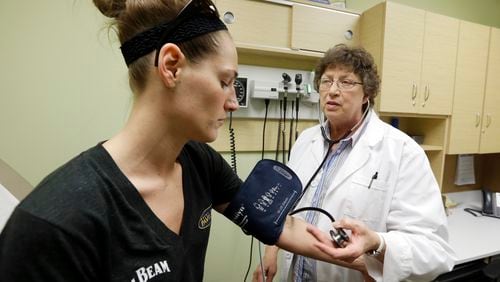What is health literacy?
It’s widely defined as the ability to obtain, process, and understand basic health information and services to make appropriate health decisions. People with strong literacy skills can face health literacy challenges, if:
• They are not familiar with medical terms or how their bodies work.
• They have to interpret numbers or risks to make a health care decision.
• They are diagnosed with a serious illness and are scared or confused.
• They have complex conditions that require complicated self-care.
From the U.S. Department of Health and Human Services
Tips for improving your health literacy
Ask questions (see specific suggestions at bottom.) Then check to be sure you receive and understand the answers. If you don’t understand, don’t be intimidated and don’t worry about asking the doctor or nurse for more information.
Repeat information back to the doctor or nurse. (Some people say this is key to finding out on both sides whether there’s a breakdown in communication.) After your doctor or nurse gives you directions, repeat those instructions in your own words. Simply say:”Let me see if I understand this.” This gives you a chance to clarify information. Studies show that doctors and patients often have very different ideas of what the patient is going to do after leaving the doctor’s office. Repeating back what you heard or think you heard can help you avoid potentially serious mistakes.
• Bring all your medicines to your next doctor’s visit. Ask your doctor to go over all of your drugs and supplements, including vitamins and herbal medicines. More than one third of adults struggle to understand how to take their medicines. You may discover some mistakes, such as two drugs that shouldn’t be taken together.
• Have another adult with you. This might be especially critical when you expect to receive important information.
• Let the doctor’s office know you need an interpreter if you don’t speak or understand English very well. You have a right to an interpreter at no cost to you. Even if you speak some English, tell the doctor’s office what language you prefer when you make an appointment.
• Make a Pill Card. Create an easy-to-use Pill Card to help patients, parents, and others keep track of medicines.
Here's a cheat sheet of questions tailor-made for whatever the specifics you face. Be bold: clip it out and put a check by each question to which you've been given an understandable and satisfactory response. Don't be afraid to circle back for further clarification.
Appointment Type: To talk about surgery
Why do I need surgery?
Is there some other way to treat my condition?
What kind of surgery do I need?
Have you done this surgery before?
Which hospital is best for this surgery?
Will I need anesthesia?
How long will it take me to recover?
How long will I be in the hospital?
What will happen after the surgery?
What will happen if I wait or don’t have this surgery?
Appointment Type: To talk about a health problem
What is my diagnosis?
Will I need any more tests?
What are my treatment options?
How soon do I need to make a decision about treatment?
How much does this treatment cost?
Are there any side effects?
What happens if I choose to not have treatment?
What is the outlook for my future (prognosis)?
Will I need special help at home?
Appointment Type: To receive or change a medicine
What is the name of the medicine?
What is the medicine for?
Can I take a generic?
When should I take it?
How much should I take?
How long do I need to take the medicine?
Are there side effects?
Do I need to avoid any food, drinks, or activities?
What should I do if I forget to take my medicine?
What should I do if I accidentally take more than the recommended dose?
Should I get a refill?
Should I stop taking any of my other medicines or vitamins?
Is there written information I can have?
Appointment Type: To get medical tests
What is the test for?
How is the test done?
How accurate is the test?
Is this test the only way to find out that information?
What do I need to do to prepare for the test?
When will I get the results?
What will the results tell me?
What’s the next step after the test?
.
_________________________
Some health experts say low health literacy could be the silent epidemic of the modern era.
In the age of technological advances, such as robotic surgeries, and an increasingly complex health care system, it’s become more challenging – and more important – for patients and medical professionals to be on the same page.
And yet, there’s evidence to say that’s not happening. About 41 percent of adult Americans have less than adequate health literacy skills – meaning they lack the ability to obtain, process, and understand basic health information and services they need to make appropriate health decisions, according to widely touted data from the National Assessment of Adult Literacy.
That can be alarming to doctors and nurses who are doling out diagnoses and prescriptions and to patients and their families who are struggling to understand what’s wrong and what it will take to feel better and stay healthy.
The fallout is hardly trivial. Researchers have found that poor health literacy leads to poor health outcomes, such as higher rates of hospitalization, lower use of preventive services, more emergency room visits, and worse control of chronic diseases – all factors in the high cost of health care. And so it’s an issue, not just in October, National Health Literacy Month, but every day.
“The higher level of health literacy the better your health status is going to be, and that has been demonstrated time after time,” said Dr. Glenda Knight, a health literacy expert and member of the board of the Georgia Alliance for Health Literacy.
At Atlanta’s Grady Memorial, the national literacy data serves as a guide to what hospital staff can expect of patients and their families, said Felicia Morton, patient education specialist.
Grady patients represent the sub-groups for whom low health literacy is even more likely: the elderly, minorities, people who did not complete high school, people whose first language or preferred language is not English, and people living below the poverty line, she said.
“These are the people we serve so we know we have to adjust our language and use other strategies to help them understand,” Morton said. “Of course, our best indicator is the anecdotal data we get from our patient care staff of what they encounter daily when trying to teach or counsel our patients.”
At Grady, the staff doesn’t try to make people more health literate, she said.
“That suggests you can bring people up to the literacy level of the health care profession, and that’s daunting, if not impossible,” Morton said. “Instead, we want to bring the language and communication styles of the health professional down to the literacy level of the people we serve.”
Basic literacy concepts are taught and modeled for the hospital’s physicians, nurses, pharmacists, dieticians, therapists and social workers, as well as for all students and residents, Morton said.
Some of the feedback from patients would seem to defy logic. For instance, many people with low health literacy, or difficulty reading in general, say they prefer health information in writing, rather than by other means such as videos, she said.
One of the hospital’s priorities is to have printed materials that meet guidelines for effective patient education, written at or below a 6th grade reading level, Morton said.
Grady has a 300-plus document library of patient education discharge instructions and other print materials that are tailor-made for it patients, she said.
Health literacy has been a concern for decades and became the topic of serious research, including in Atlanta, in the 1990s. Helen Osborne, an occupational therapist, launched Health Literacy Month in 1999.
Don Rubin, board member and past chairman of the non-profit Georgia Alliance for Health Literacy, said the “real alarm” about health literacy sounded with the 2003 National Assessment of Adult Literacy project, which for the first time included health literacy and found a 12-percent level of proficiency.
“The health literacy movement simply put a name to that unfortunate communication gap and documented its serious consequences … and also began to provide remedies,” said Rubin, emeritus professor at the University of Georgia’s Department of Communications Studies, Department of Language & Literacy Education.
With advances in healthcare, the situation becomes more complex, he said.
“Most providers now try to encourage ‘shared decision-making,’ egged on by various agencies and organizations, but some concepts are very difficult for lay people to understand,” Rubin said.
He cites, as an example, the growing knowledge of the role of genetics in disease risk.
“Many people lack the health literacy to really grasp what it means to say that ‘because we found this gene in your chromosomes, your risk of cancer is three times the average risk and stands at 6 percent.’ So, improved healthcare options require greater health literacy,” Rubin said.
Recently, the Centers for Disease Control and Prevention added health literacy items to the national Behavioral Risk Factor Surveillance System (BRFSS) survey, he said.
“Those data have not yet been analyzed, but when they are, we will have a better measure of how Georgia ranks in health literacy,” he said.
A study published in the September issue of Academic Emergency Medicine found that low health literacy is a risk factor for potentially preventable emergency room visits, particularly visits resulting in hospital admissions.
Health literacy expert Knight said she sees a “big gap in communications” with both the healthcare professional and patient.
The medical professional can be part of the problem if he or she uses medical jargon or technical terms or gives the patient the impression he or she is on a tight schedule, Knight said.
“Patients tend to know when doctors are hurried and don’t have time for them, and they shut down,” she said. “Health care professionals need to be aware of that and make them feel welcome and make them want to participate.”
On the flip side, the patient may need training in how to ask questions and be more engaged, Knight said.
She teaches strategies to community health care workers, in collaboration with Morehouse School of Medicine’s iADAPT 2.0 REACH Project. One of those strategies that has proven successful is to ask the patient to repeat back what he or she has heard. That’s an effective way, Knight said, of establishing whether the patient not only heard but also comprehended what the nurse or doctor said.
For more info, visit the Georgia Alliance for Health Literacy at www.GeorgiaHealthLiteracy.org
About the Author






